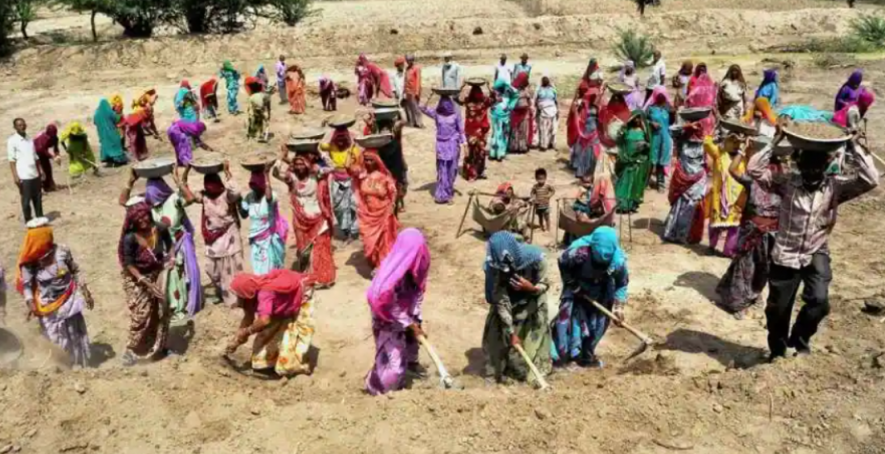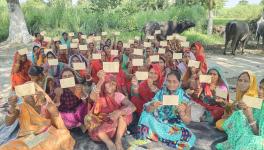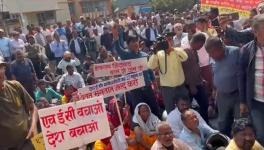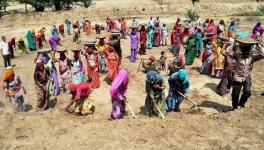‘Assault on Right to Work’: NREGA Workers Organisations Slam Budget Allocation

Image Courtesy: PTI
Delhi: The NREGA Sangharsh Morcha and Peoples' Action for Employment Guarantee on Saturday said the FY 2023-24 budgetary allocations for the MGNREGA (Mahatma Gandhi National Rural Employment Guarantee Act) is a “travesty” and “an assault” on people’s right to work.
In their statement, the organisations pointed out that the NREGA allocation for FY 2023-24 as a percentage of the GDP is around 0.198%, which is the lowest ever share. They also announced a call for a 100-day protest in this regard in Delhi from February 6.
The statement said that with the estimated pending liabilities of this current year, only Rs 50,600 crores would remain for expenditure, and hence, only 16.64 days of work per active household can be generated for FY 23-24. “If we consider all 16 crore registered HHs, the days will further decreased to just 10 days,” it said.
The budgetary allocation for FY 2023-24 has been reduced to Rs. 60,000 crore for NREGA despite revised estimates for the current financial year coming in at Rs 89,400 crore, the statement said. It added that in their pre-budget note, the organisations advised that Rs.2 72 lakh crore will be needed to provide the guaranteed 100 days of work to at least those who worked in the current fiscal. “This amounts only to around 1% of the GDP and is in fact a conservative estimate that considers only households that were employed this year at the estimated minimum wage rate,” they said.
“This unjust allocation by the Modi Government is an assault on rights of rural workers and is a step towards killing the programme. In response, NREGA workers around the country hit the road on NREGA Diwas (February 2) to protest against budget cuts,” the statement said.
According to the NREGA Sangharsh Morcha and Peoples' Action for Employment Guarantee, The unprecedented budget cut will lead to an array of issues, including massive delays in wage payments, suppression of work demand, and a lack of quality assets getting created.
Further, the Periodic Labour Force Survey (PLFS) 2020-21 shows the overall rural unemployment in India is 6.48%, whereas the World Bank data shows that four out of five women were not in the labour force in 2021 in India, the statement noted. “These statistics clearly indicate the distress being faced by the unemployed, particularly in the informal sector. Low levels of employment and low wages also lead to low consumption, which in turn adversely impacts economic growth by reducing bottom-up aggregate demand,” it said.
It contended that NREGA had palpable impacts despite the programme functioning at half its capacity, as the average number of work days per household has been between 40 and 50 days in the past five years. As an example, the statement cited a recent study that showed “20-60% of households in Bihar, Karnataka, Madhya Pradesh and Maharashtra felt that NREGA contributed to overall development of the village and not having to migrate was frequently mentioned as the positive aspect of the programme.
Expressing their disappointment over the budget, the organisations said, “The current regime continues to shrink workers’ rights in form of delayed wage payments, excessive digitisation and centralisation of the programme, as well as changes introduced with no worker-consultation.”
In response to the above issues and the “systematic undermining of the Act”, hundreds of NREGA workers and their allies from across the country will assemble under the banner of the NREGA Sangharsh Morcha in Delhi to protest for 100 days starting February 6, the statement added.
Get the latest reports & analysis with people's perspective on Protests, movements & deep analytical videos, discussions of the current affairs in your Telegram app. Subscribe to NewsClick's Telegram channel & get Real-Time updates on stories, as they get published on our website.
























